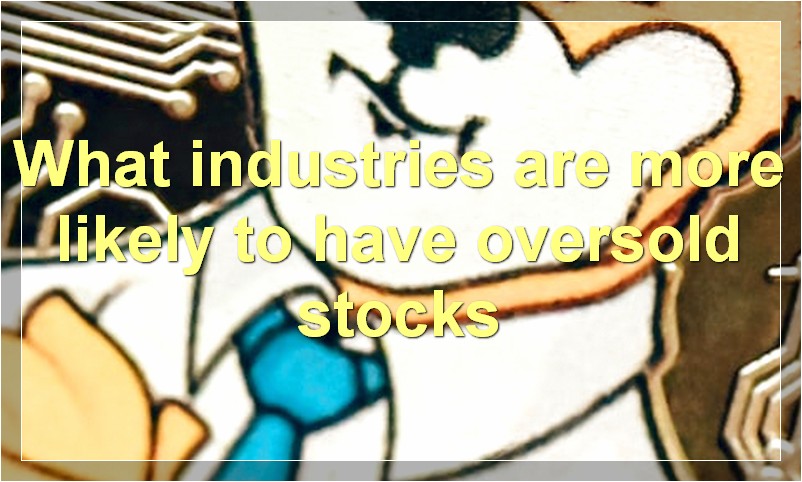If you’re thinking about investing in stocks, you need to know about oversold stocks. These are stocks that are being sold at a lower price than they are worth, and they can be a great investment.
What is oversold stock and how does it differ from regular stock
When it comes to stocks, there are a lot of different terms that get thrown around. One of those terms is “oversold.” But what does oversold actually mean?
An oversold stock is a stock that has been sold off more than is warranted by its underlying fundamentals. In other words, the stock has been “oversold” by investors.
This can happen for a variety of reasons. Maybe there was a sell-off in the overall market and the stock got caught up in it. Or maybe investors are concerned about the company’s fundamentals and are selling the stock accordingly.
Whatever the reason, an oversold stock is one that is trading at a significantly lower price than it should be based on its underlying fundamentals.
So how does this differ from a regular stock?
Well, a regular stock is one that is trading at a fair price based on its underlying fundamentals. The key word here is “fair.” That doesn’t mean the stock is necessarily cheap or expensive, but rather that its price is in line with its fundamentals.
An oversold stock, on the other hand, is trading at a price that is lower than its fundamentals would warrant. This can be due to a variety of factors, as we mentioned above.
If you’re thinking about buying an oversold stock, it’s important to do your homework first. You need to make sure that the sell-off is warranted and that the stock is actually trading at a discount. Otherwise, you could end up overpaying for a stock that isn’t really all that cheap.
How do investors identify oversold stocks

Oversold stocks are ones that have been sold off more than is warranted by the underlying fundamentals. This can happen for a variety of reasons, but it usually occurs when investors are worried about the company’s prospects and are looking to cash out their positions.
There are a few ways to identify oversold stocks. First, you can look at the price action. If a stock has been falling for a sustained period of time and is now trading at significantly lower levels, it could be oversold. Second, you can look at technical indicators such as the Relative Strength Index (RSI). A stock is considered oversold when the RSI falls below 30. Finally, you can look at valuation ratios such as the price-to-earnings (P/E) ratio. A stock is considered oversold when the P/E ratio falls below 10.
Investors typically buy oversold stocks because they believe that the sell-off is unwarranted and that the stock will eventually rebound. When buying oversold stocks, it’s important to have a stop-loss in place in case the sell-off continues.
What are the risks associated with investing in oversold stocks
There are a few risks associated with investing in oversold stocks. The first is that the stock may not rebound, and you could lose money. Secondly, even if the stock does rebound, it may not rebound to its previous highs, and you could still end up losing money. Finally, oversold stocks are often volatile, and you could experience substantial losses if you don’t manage your risk properly.
What are the potential rewards of investing in oversold stocks
When a stock is oversold, it means that it has been heavily sold and the price has dropped significantly. This can be a great opportunity for investors to buy the stock at a lower price and then sell it when the price goes back up. Oversold stocks often rebound quickly, so investors who are quick to act can make a lot of money.
When is the best time to buy oversold stocks
There is no simple answer to this question, as there are many factors to consider when trying to time the market. However, one general rule of thumb is to buy oversold stocks when they are trading at a discount to their intrinsic value.
One way to measure a stock’s intrinsic value is by looking at its price-to-earnings (P/E) ratio. This ratio tells you how much you are paying for each dollar of a company’s earnings. A low P/E ratio indicates that a stock is undervalued and may be a good buying opportunity.
Another factor to consider is the overall market trend. If the market is in a long-term uptrend, then it may be a good time to buy oversold stocks. However, if the market is in a downtrend, then it may be best to wait for a rebound before buying.
Finally, it is important to have an exit strategy in mind before buying any stock. This will help you lock in profits and avoid losses if the stock doesn’t perform as expected.
What industries are more likely to have oversold stocks

It’s no secret that some industries are more likely to have oversold stocks than others. But which ones?
For starters, let’s look at the oil and gas industry. This is an industry that is notoriously volatile, and stocks tend to swing widely in both directions. When oil prices drop, as they did in late 2014, companies in this sector are quick to slash budgets and lay off workers. This can lead to a sharp decline in stock prices, even for companies that are otherwise well-managed.
The same is true for mining companies. When commodity prices fall, these firms are often forced to cut production and scale back operations. This can lead to big losses, and investors typically react by selling their shares.
Another industry that is prone to oversold stocks is retail. This is because the margins in this sector are often razor-thin, and even a small dip in sales can lead to big losses. For example, when Macy’s announced disappointing holiday sales in 2016, its stock price tumbled 10%.
So, if you’re looking for industries with oversold stocks, keep an eye on oil and gas, mining, and retail. These sectors tend to be more volatile than others, and share prices can drop sharply when conditions deteriorate.
What economic conditions lead to oversold stocks
When the stock market is oversold, it means that there are more sellers than buyers. This can happen for a variety of reasons, but usually happens when investors are worried about the future and think that the prices will continue to fall. This can lead to a self-fulfilling prophecy, where the prices do indeed fall because people are selling.
There are a few indicators that the stock market is oversold. One is when the price falls below the moving average. This means that the average price of the stock over a certain period of time (usually 50 or 200 days) is lower than it was previously. This can be a sign that people are losing confidence in the stock and expect the price to continue to fall.
Another indicator is when the Relative Strength Index (RSI) falls below 30. The RSI is a technical indicator that measures how overbought or oversold a stock is. A reading below 30 means that the stock is oversold and could be due for a rebound.
If you’re thinking about buying stocks when the market is oversold, it’s important to do your research first. You want to make sure that the reason for the sell-off is temporary and that the fundamentals of the company are still strong. If you buy when everyone else is selling, you could end up getting a great deal on shares of a great company.
Can oversold stocks be a good long-term investment
Yes, oversold stocks can be a good long-term investment. Many investors tend to shy away from these stocks because they are down in price and may appear to be risky. However, if you do your research and find a company that is undervalued, you may be able to make a profit in the long run. Oversold stocks often rebound over time as the market corrects itself.
How can investors protect themselves from losses when investing in oversold stocks
Investors can protect themselves from losses when investing in oversold stocks by being aware of the risks associated with these stocks and by doing their research before investing. Oversold stocks may be more volatile and risky, so it is important to be aware of these risks before investing. Additionally, investors should always consult with a financial advisor to get the most accurate and up-to-date information before making any investment decisions.
What are some of the most successful strategies for investing in oversold stocks
When a stock becomes oversold, it means that it has been sold off more than usual and is now undervalued. This presents an opportunity for investors to buy the stock at a discount. There are a few strategies that can be used to identify oversold stocks, including:
1. Look for stocks that have been recently downgraded by analysts.
2. Look for stocks with high short interest. This means that there are a lot of people betting against the stock, which creates downside pressure.
3. Use technical analysis to identify stocks that have reached new lows but are starting to show signs of reversal.
Once an oversold stock is identified, the next step is to determine whether or not it is a good investment. This involves looking at the company’s financials, business model, and competitive landscape. If the company is sound and has a bright future, then buying the stock at a discount can be a great way to generate returns.

